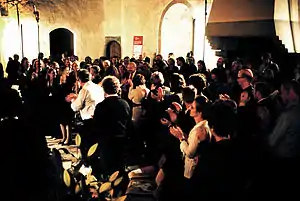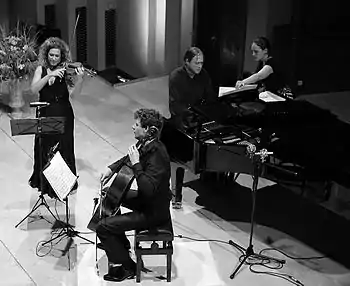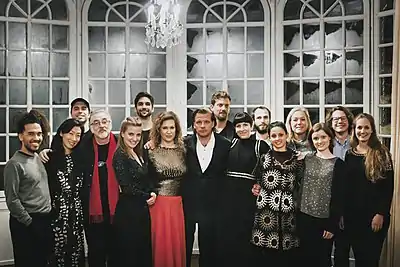GAIA Music Festival
The GAIA Music Festival founded by the violinist Gwendolyn Masin is described as one of the most important festivals in Switzerland.[1] The festival is hosted in Oberhofen on Lake Thun, usually in the month of May. The Festival is non-profit. From 2010 until 2014, the Patron of the Festival was David Zinman.

History
The GAIA Chamber Music Festival was founded in 2006, and hosted near Stuttgart, where it was rewarded by two consecutive years of highly praised programmes and sold-out halls. The Festival was honoured with the Göppinger Kulturpreis[2] for its outstanding impact on the cultural landscape. In 2009, the Festival made its debut in and around Thun. In 2014, the Festival was renamed to GAIA Music Festival. In 2015, the Festival made Oberhofen on the Lake of Thun its central location.

Musicians
Each year, artists from all over the globe spend just over a week living and working together in Thun. The invitees, reflecting GAIA's objectives, have contributed to the world of arts in unusual and exciting ways. So far more than eighty artists have performed at the GAIA Festival.
Artists featured
Violin: Gabriel Adorján, Shmuel Ashkenasi, Sandrine Cantoreggi, Daniel Garlitsky, Philippe Graffin, Anke Dill, Ilya Hoffmann, Esther Hoppe, Wonji Kim, Pil Kyun Paul Kim, Yura Lee, Gwendolyn Masin, Ronald Masin, Gina Maria McGuinness, Lena Neudauer, Sergey Ostrovsky, Igor Ozim, Rosanne Philippens, Rahel Rilling, Svetlin Roussev, Tatiana Samouil, Lisa Schatzman, Artiom Shishkov, Alexander Sitkovetsky, Jan Talich, Kirill Troussov, Isabelle van Keulen, Mary Ellen Woodside
Viola: Alessandro D'Amico, Guy Ben-Ziony,[3] Gérard Caussé, Isabel Charisius, Blythe Teh Engstroem, Jan Gruening, Ilya Hoffman, Yura Lee, Anna Lipkind, Lilli Maijala, Vladimir Mendelssohn, Natalia Tchitch, Lars Anders Tomter, Mikhail Zemtsov, Dana Zemtsov
Cello: Dávid Adorján, Claudio Bohórquez, Alexander Chaushian, Nathalie Clein, Christoph Croisé, Thomas Demenga, Chiara Enderle, Christopher Franzius, Pavel Gomziakov, Frans Helmerson, Louise Hopkins, Christopher Jepson, Guy Johnston, Aleksei Kiseliov, Dóra Kokas, Gavriel Lipkind, Philippe Muller, David Pia, Rafael Rosenfeld, Timora Rosler,[4] Martti Rousi, Jakob Spahn, Torleif Thedéen, István Várdai,[5] Quirine Viersen
Cimbalom: Miklós Lukács[6]
Harpsichord: Vital Julian Frey
Contrabass: James Oesi, Massimo Pinca
Flute: Janne Thomsen, Kaspar Zehnder
Clarinet: Reto Bieri, Don Li, Christoffer Sundqvist, Yevgeny Yehudin[7]
Bassoon: Martin Kuuskmann
Saxophone: Daniel Schnyder
Piano: Julia Bartha,[8] Alasdair Beatson, Simon Bucher, Finghin Collins, Peter Frankl, Robert Kulek,[9] Alexander Lonquich, Aleksandar Madzar, Vincenzo Maltempo, Hannes Minnaar, Pascal Rogé, Marianna Shirinyan, Cédric Pescia, Dobrinka Tabakova, Roman Zaslavsky,[10] Bálint Zsoldos
Mezzo Sopran: Jordanka Milkova, Stephanie Szanto
Harp: Sarah Christ, Jana Boušková
Percussion: Pavel Bialiayeu, Andrei Pushkarev
Ensembles: Ariel Quartet, Aviv Quartet, Grazioso Chamber Orchestra of the Hungarian National Philharmonic, Haas & Mann The Lipkind Quartet, Merel Quartet, Melisma Saxophon Quartet, ORIGIN Ensemble (Léa Valentin (Violin), Priyanka Ravanelli (Violin), Alexina Barbe (Violin), Martin Moriarty (Viola), Patrick Moriarty (Cello)), Quatour Ernest; Tonus String Quartet, Young European Strings Chamber Orchestra, Yurodny
Premieres
In 2009 works by Don Li, performed by the composer with Ania Losinger, Matthias Eser, and the Tonus String Quartet were introduced to the public. The arrangement of Johan Halvorsen's "Passacaglia" - especially written for the GAIA Music Festival - received its world premiere.
In 2010, Jorge Bosso’s "Moshee" for cello and strings enjoyed its world premiere and works by Max Bruch, Johann Sebastian Bach, Pyotr Tchaikovsky, Johan Halvorsen and Robert Schumann – including the first piano quartet by the latter – were given their debut performance in Switzerland.
Compositions or transcriptions of works by Kurt Atterberg, Alban Berg, Ernest Bloch and Cesar Viana were premiered in 2011.
In 2012, transcriptions of works by Johann Sebastian Bach received premieres.
2013, the fifth birthday of GAIA in Thun, saw a celebration of new works and transcriptions played for the first time by composers such as Luigi Boccherini, Arcangelo Corelli, Astor Piazzolla, Andrei Pushkarev, Franz Schubert, and by the group Yurodny.
In 2014, Bagatelle of Benjamin Britten for violin, viola and piano and works by Paul Juon received their Swiss premier.
Daniel Schnyder was Composer-in-Residence in 2015. Among the many works of his that were played during the Festival, his "Mensch Blue" had its debut performance and "Ad Parnassum" its first performance in Switzerland.
2016 saw the first inclusion of premieres of works of literature, as well as music. Lukas Hartmann wrote texts to Telemann’s "Burlesque de Quixotte"; Stravinsky’s "Suite italienne" as well as Mussorgsky’s "Pictures at an Exhibition". The latter also received its Swiss premiere in a version for string quintet and piano.[11] Further works to receive international premieres were by Camille Saint-Saëns and Manuel de Falla, in arrangements written by Raymond Deane for Gwendolyn Masin's ORIGIN.
The festival programme of 2017 also included several world premieres. Massimo Pinca's "The Fates" for String Quartet and Cimbalom, OLUM by Marco Antonio Perez-Ramirez, "Bartók-Impressions" (after the "Romanian Folk Dances Sz. 68" by Béla Bartók) by Miklós Lukács, as well as Maximilian Grossenbacher's "Airreel" received their world premieres. The Swiss premiere of Rebecca Clarke's "Grotesque" also took place.[12][13]
The programme of the tenth GAIA Festival saw three world premieres in 2018: "Andante für einen Oberhofer Purzelbaum" and "Bourlesque" by Thomas Fortmann and the "Hungarian-Jewish Melodies" by Raymond Deane.
Thomas Fortmann dedicated his "Dreisamkeit" for mezzo soprano, clarinet and double bass to the 11th edition of GAIA Music Festival, which also received its world premiere at the festival in 2019. Dobrinka Tabakova performed her "Whispered Lullaby" together with Gwendolyn Masin in the Swiss premiere of the work for violin and piano.
Masterclasses
Each year, internationally renowned performers and teachers coach young instrumentalists. During GAIA Masters, the most promising instrumentalist or chamber-music ensemble participating in the open Masterclasses will be chosen to return in the following year – as guest artist during the annual Music Festival.

Artistic Director
Artistic director and founder of the GAIA Festival is virtuoso violinist Gwendolyn Masin.
Discography
- GAIA Music Festival 2009: Music of Brahms, Dvorák & Prokofiev
- GAIA Music Festival 2010: Music of Atterberg, Bruch, Schumann & Weiner
- GAIA Music Festival 2011: Music of Berg, Bloch, Debussy, Ligeti & Webern
- GAIA Music Festival 2012: Music of Krenek & Webern
- GAIA Music Festival 2013: Music of Hiller & Piazzolla
- GAIA Music Festival 2014: Music of Bridge & Britten
- GAIA Music Festival 2015: Music of De Falla, Medtner & Schnyder
- GAIA Music Festival 2016: Music of Beethoven, Mussorgsky, Popper & Stravinsky
- GAIA Music Festival 2017: Music of Liszt, Beethoven & Ravel
Articles
- "Der Sog des virtuosen GAIA-Festivals" - Thuner Tagblatt, 7 May 2019
- "Der Wunsch, geerdet zu sein" - Anzeiger Region Bern, 1 May 2019
- "Kammermusik hautnah" - Thuner Tagblatt, 1 May 2019
- "Sehnsucht als Antrieb" - Der Bund, 25 April 2019
- "Klassik in luftiger Höhe" - Thuner Tagblatt, 8 May 2018
- "Vom Sultanpalast nach Florenz" - Thuner Tagblatt, 5 Mai 2018
- "Warum klassische Musik nicht elitär ist" - Jungfrau Zeitung, 4 Mai 2017
- "Geigestunde ohne Geige" - Jungfrau Zeitung, 10 May 2016
- "Gaia ist angekommen" - Der kleine Bund, 9 Mai 2015
- "Klassik für alle" - Gala Kultur, 14 August 2014
- "Jubiläum im Kammerformat" - Berner Kulturagenda, 29 May 2013
- "Kammermusik so schön wie aus dem Märchenbuch" – Thuner Tagblatt, 11 May 2010
- "Gaia – Musik in aller Intensität" – Ensuite Kulturmagazin, 1 May 2010
- "Born of chaos – matured to perfection" – Thuner Tagblatt, 18 May 2009
References
- http://www.gaia-festival.com/downloads/05_GAIA_ENSUITE_2011.pdf
- "Archived copy". Archived from the original on 2 April 2015. Retrieved 2014-09-21.CS1 maint: archived copy as title (link)
- Guy Ben-Ziony
- Timora Rosler
- "István Várdai receives 'Du Pré-Harrell' Stradivarius cello on extended loan". The Strad. 13 December 2016. Retrieved 30 September 2017.
- Miklós Lukács
- Yevgeny Yehudin
- Julia Bartha
- Robert Kulek
- Roman Zaslavsky
- http://www.srf.ch/sendungen/im-konzertsaal/gaia-musikfestival-musik-und-wort
- http://www.gaia-festival.com/en/about-gaia/gaia-music-festival-oberhofen/programme-tickets/
- http://www.bernerzeitung.ch/kultur/klassik/musikalische-reise-in-magische-sphaeren/story/15290189/